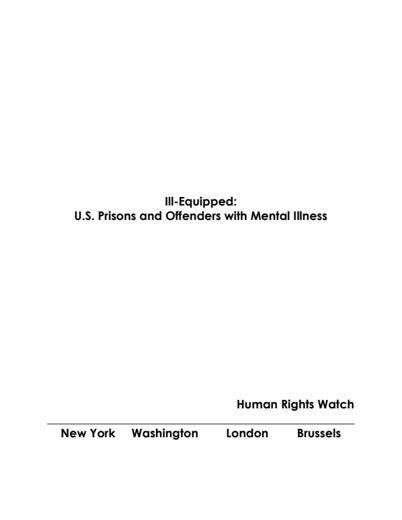Ill-Equipped: U.S. Prisons and Offenders with Mental Illness documents the growing problem of mentally ill inmates in U.S. prisons. The report highlights the inadequate treatment and abuse of the mentally ill in what have become the country's de facto mental institutions. A publication from Human Rights Watch, Ill-Equipped was prepared with support from OSI.
Among the report's findings and recommendations are:
- One in six prisoners is mentally ill. Many of them suffer from serious illnesses such as schizophrenia, bipolar disorder, and major depression. There are three times as many men and women with mental illness in prisons as in mental health hospitals;
- The rate of mental illness in the prison population is three times higher than in the general population. The high rate of incarceration of the mentally ill is a consequence of under-funded, disorganized, and fragmented community mental health services;
- Many people with mental illness—particularly those who are poor, homeless, or struggling with substance abuse problems—cannot get mental health treatment;
- If they commit a crime, even low-level nonviolent offenses, punitive sentencing laws mandate imprisonment;
- Prisoners with mental illness are likely to be picked on, physically or sexually abused, and manipulated by other inmates, who call them "bugs;"
- Mentally ill prisoners can find it difficult if not impossible to comply with prison rules, and end up with higher than average rates of disciplinary infractions;
- Security staff—who usually lack training in mental illness—do not distinguish between the prisoner who is disruptive or fails to obey an order because of illness and a prisoner who causes problems for other reasons;
- Human Rights Watch urges the U.S. Congress to enact legislation proposed by Sen. Mike DeWine (R-Ohio) and Rep. Ted Strickland (D-Ohio) that would provide federal grants to divert mentally ill offenders into treatment programs rather than jail or prison, and to improve the quality of mental health services provided to jail and prison inmates;
- Human Rights Watch recommends the use of independent mental health experts to assess mental health services in each prison system, urges elected officials and the heads of correctional agencies to ensure that mentally ill prisoners receive mental health services consistent with community standards of care, and calls for rules to prevent housing prisoners with mental illness in isolated confinement or super maximum security prisons.
Read more
Homicide Reduction
Q&A: How One Colombian City Is Tackling Violent Crime

Palmira, Colombia, is one of the most violent cities in the world. But a prevention program focusing on youth has reduced crime significantly—and earned it an international peace prize. The city’s mayor on what’s working.
In Remembrance
Lani Guinier’s Overlooked Education Legacy

The late Lani Guinier thought deeply about the intersection between education and criminal justice. Her leadership at Open Society helped pave the way to colleges across the country offering higher education to the incarcerated.
WOMEN'S RIGHTS
Challenging Mexico’s Abusive Preventative Detention System

Mónica Esparza’s case is one of the most notorious cases of extreme gender violence carried out by Mexican authorities. What her story teaches about how to combat the country’s scourge of gender-based violence.
